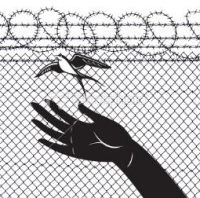Maryland CURE’s Executive Director is profiled in the Capital Gazette. Lea Green is truly one of the great “she-roes” of CURE. Read her story here and learn how she is making a difference in her community.
Maryland CURE’s Executive Director is profiled in the Capital Gazette. Lea Green is truly one of the great “she-roes” of CURE. Read her story here and learn how she is making a difference in her community.
By THERESA WINSLOW twinslow@capgaznews.com
Lea Green doesn’t wear a button on her chest declaring her cause.
She wishes she didn’t even have to talk about the work that earned her a Fannie Lou Hamer Award.
It would mean her son wasn’t in prison for murder. It would mean Green didn’t have to spend her retirement working for prison reform and hoping her son will one day come home.
“It’s nothing I’d wear as a badge of honor,” said the 72-year-old great-grandmother, who serves as president of Maryland CURE (Citizens United for the Rehabilitation of Errants). “But… someone’s got to do this.”
The Millersville resident, who spent 33 years with the Postal Service, is among seven women who are the 2013 recipients of the award. “I’m awed and honored,” Green said. “This really has thrown me for a loop.”
She and the others will be presented with a plaque and recognized at the 18th annual awards ceremony at St. John’s College on Sunday afternoon.
“It’s a wonderful opportunity to recognize unsung ‘she-roes,’” said Arlene Jackson, chair of the Fannie Lou Hamer Reception Committee. “It’s normal people going through their normal day doing what they can to encourage people.”
Hamer, who died in 1977, was a civil rights and voting rights activist who spoke at the 1964 Democratic National Convention.
The awards fall on her birthday of Oct. 6 and are meant to recognize women who do vital work but aren’t household names. The Dr. Martin Luther King Jr. Committee sponsors the awards.
In order to qualify for the award, women have to either live or work in Anne Arundel County and be nominated. A committee sifts through the nominations to pick the honorees.
The other 2013 honorees are:
- Joyce Amos of Annapolis. She was the first African-American bank manager in Annapolis and one of the founding members of the Kunta Kinte Heritage Festival. She works part-time during the General Assembly as a legislative clerk for House Speaker Michael Busch.
- Mary Cromwell of Severna Park. A foot solider, Cromwell worked for the state and was president of a union. She’s active in Blacks in Government and at her church, Asbury Broadneck United Methodist.
- Gloria Threadgill McLaughlin of Reisterstown. McLaughlin is a foot solider instrumental in helping to create the Civil Rights Foot Soldiers Memorial in Annapolis. A member of the King committee board, she’s worked in education and the social sciences, as well as the federal government. She published a 2012 book on job creation.
- Robin Revell-Dunn of Deale. She is a community activist and volunteer with Sojourner-Douglass College, from which she’s a summa cum laude graduate.
- Mary Ellen Turner of Annapolis. She is a service coordinator and resident services manager for the Housing Authority for the City of Annapolis. She joined the Housing Authority in 2002. Turner also worked for many years with the Department of Social Services.
- Rhonda May Winfrey of Annapolis. Winfrey runs “EXPRESSIONS” Dance Co. She launched the company in 1992, focusing not only on dance but building character, discipline and self-esteem in her students.
“Like Fannie Lou Hamer, these women’s contributions have left a lasting impact on this community,” said Carl Snowden, founder and chair of the King committee. “They’re collective commitment to improving their community is only superseded by their belief in a society based on equality.”



